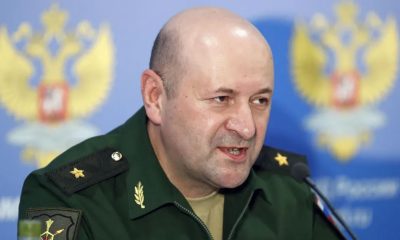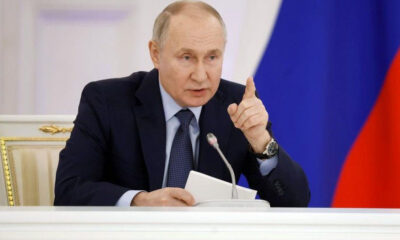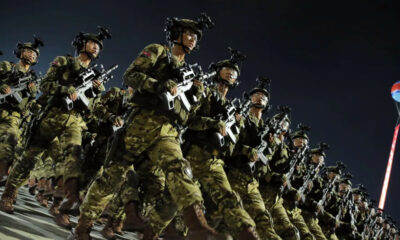International
Russia sends soldiers to war but ignores mental trauma they bring home

When Vladimir returned from the front line to his hometown in Siberia, his wife barely recognized him.
The nice young man she married in university was gone. Instead, she now lived with a secluded, abusive husband who routinely drank himself into oblivion, brutally beat her and tormented their three children.
Their four years of happy marriage had ended when Vladimir was conscripted into the Soviet army in the mid-1980s and sent to fight in Afghanistan. He rarely spoke about what he experienced, except when the flashbacks occasionally broke through from the depths of his consciousness during drinking bouts.
“He would get so drunk he wouldn’t remember who was in front of him, and he’d confuse us with those on the front line, screaming that he was going to kill us all,” his daughter, Alya, said in an interview, speaking on condition that only first names be used to protect her family’s privacy.
It is now widely understood that psychological injuries remain long after combat ends. And as Russian President Vladimir Putin presses on with his bloody war in Ukraine, it is only a matter of time before thousands of veterans begin returning from the front — to their families and to a failed mental health care system that many experts say is no better equipped to help them than it was when the Afghanistan war ended in 1989, or after two wars in Chechnya in the 1990s and 2000s.
Violent altercations involving soldiers who returned from Ukraine this year are already piercing through the slumber of Russian society, which has tried to tune out the war from daily life.
READ ALSO:
- 2023 election: Be ruthless with criminals, Chief of Army Staff orders officers
- Kanu’s release: South East govs, leaders under fire
- Argentina hit W’Cup semis after terrific shootout display
- Bandits Abduct Zamfara Lawmaker’s three daughters, wife and a son
In September, a soldier who recently returned from “behind the ribbon,” a euphemism for the Ukrainian border, walked into a pizzeria in Tula and hit the owner with a metal chair, reportedly dissatisfied by the look the owner gave him.
A month earlier, in Rostov-on-Don near the Ukrainian border, the captain of a missile regiment shot a taxi driver who said he opposed the invasion of Ukraine, according to local media.
Already more Russian soldiers have been killed in nine months of war in Ukraine — more than 25,000, according to British Defense Ministry estimates — than in the decade-long Soviet mission in Afghanistan, in which 15,000 died.
“When soldiers return from Ukraine, their families and friends will be the first ones to suffer because the soldiers will go nuts from all the injustice,” said Dmitry Florin, a journalist and a veteran of the Second Chechen War. “And if later it starts to dawn on them that the whole war in Ukraine is one of the biggest deceptions of this century, and that they were sent there like cattle to kill people with their own hands, it will be a nightmare.”
“After their relatives, the state will be their next target of placing anger and their main enemy,” Florin added, “as it is the state that ruined their lives.”
Florin said that his tours in Chechnya still haunt him in a recurring nightmare, where a general orders him to go back even though he quit military years ago.
He said that the authorities effectively discarded many of his comrades after their return from the war. Promised financial payments were often never received — Florin sued his local military office for eight years to get his — and officials dismissed their requests for any rehabilitation or psychological help.
The only counseling, Florin said, was during mandatory “prep” sessions before each deployment to Chechnya, which he said felt more like ideological indoctrination with “hate lessons.”
The war in Ukraine means that Russian men born in the late 1990s or early 2000s will grapple with the same lack of support provided to Russian men born in the 1960s to 1980s who served in the military operations in Afghanistan and Chechnya, which as in Ukraine now, the Kremlin refused to call “wars.”
While the Kremlin’s use of euphemisms is commonly viewed as part of a propaganda campaign, the lack of a formal war declaration can have legal and financial implications for Russian soldiers who, as a result, may not technically qualify as being eligible for veterans’ benefits.
Soldiers who fought in Afghanistan and Chechnya were eventually granted veteran status and modest benefits similar to those who served in World War II, known in Russia as the Great Patriotic War, but they hardly basked in glory.
READ ALSO:
- Ronaldo never told me he wanted to leave, says United Boss
- DSS ultimatum: Abuja filling stations commence 24 hours operation
- Why Nigeria’s public debt hits N44trn – DMO
- Nigeria customs seize 2,375 litres of PMS, foreign rice
A conflict in a foreign land, Afghanistan, that was at first hidden from the population and the “counterterrorism” operations to suppress Chechen guerrillas in a rebellious territory seemed alien compared to the Red Army’s defense of mainland Russia against Nazi Germany that became a pillar of Soviet identity.
Instead, “Afghantsi,” as the Afghan veterans are commonly referred to in Russia, were quickly forgotten by the state and did not find sympathy in the general public. The chaos that ensued from the fall of the Soviet Union only exacerbated the situation of widespread and untreated post-traumatic stress and an overall sense of purposelessness experienced by thousands of ex-soldiers.
“Returning from Afghanistan, they could not find a use for themselves, without a profession and education, many of them are forced to drag out a miserable existence, especially those who were injured and became disabled,” concluded a 1993 sociological paper, published by the Russian Academy of Public Administration four years after the Soviet withdrawal from Afghanistan. “They no longer had the strength to earn money, and their pensions are barely enough not to starve to death,” the report said.
And if surgeries and prosthetics for missing limbs were eventually obtainable, there was little to no psychological help available to address the trauma veterans suffered.
Even now, there are no centralized Russian rehabilitation programs for veterans of military conflicts and those returning from Ukraine risk being left to their own devices as private organizations struggle to cope with the rise of people needing help, according to a Russian grass-roots support group called War Veterans.
“There are no rehabilitation programs themselves, because no one tests veterans for [psychological] trauma, and its effect on the physical state of the body,” the group said. “There is no individual approach to assessing the condition of combatants and often a common single and ineffective template is applied en masse.”
According to War Veterans, the Russian government provides grants to veterans’ unions and individual groups set up by former soldiers, effectively outsourcing counseling and rehabilitation. The existing network of government-run military sanitariums, a Soviet-era relic where wounded ex-soldiers could spend several weeks for recovery, has also proven to be ineffective. There are few such facilities and even fewer with specialized programs for veterans.
Some Afghantsi, and later Chechnya veterans, formed the core of organized crime groups that defined much of the 1990s in Russia. Amputees in military uniforms begging for money on the streets or veterans busking on town squares singing wartime songs were a frequent scene in Russia in the 1990s and 2000s. Alcoholism and drug use spiked among former combatants, often hand in hand with domestic abuse.
READ ALSO:
- Voting Atiku is a threat to our national unity – Fayose
- Sit-at-home: Gunmen kill policeman, Pawpaw’s brother, injure commissioner
- Morocco, Africa’s surprise in Qatar – Eagles coach
Zinky Boys, Svetlana Alexievich’s collection of firsthand accounts from the war in Afghanistan, which is probably one of the fullest depictions of the disarray experienced by soldiers and their families, opens with a monologue by a mother whose son killed a neighbor with a kitchen ax and put it back into her cupboard as if nothing unusual had happened.
The book paints a picture of forgotten soldiers, left to fight their demons and the chaotic Russian bureaucracy on their own.
“When Afghantsi came to the authorities to solve some problems, they were always told: ‘I didn’t send you to Afghanistan,’ ” retired Col. Leonid Khabarov recalled in a 2019 Current Time TV special commemorating 30 years since the Soviet withdrawal, referring to years-long legal battles for compensation and health care promised by the state.
According to Alya, her family only realized Vladimir was dealing with a severe case of PTSD later in life, as they had never heard the term and access to psychological help was severely limited.
There were no one-on-one counseling sessions. Vladimir went to several group meetings set up for Afghan veterans, but they only triggered him, and each gathering led to drunken violence. Vladimir was especially harsh on his son.
Alya’s mother for years tried to protect her children from abuse, but constant beatings took a toll on her mental and physical health. She also developed an alcohol addiction, barely left the house in her final years, and died recently from liver failure. Neither Alya nor her elder siblings married or had children, fearing they might carry the abuse and trauma into a new generation.
“We discuss it often with my brother: Should we, with our family experience, ever have kids? Will we be able to raise normal people, or will we turn into our parents?” Alya said.
“People who will be returning soon from Ukraine are not only traumatized but also corrupted by all-permissiveness,” Alya said. “This won’t be just something they keep in the families; it will pour onto the streets.” She added: “There will be thousands of men just like my father, and it won’t be safe either for them and for us.”
International
Syria not threat to world, rebel leader al-Sharaa tells BBC
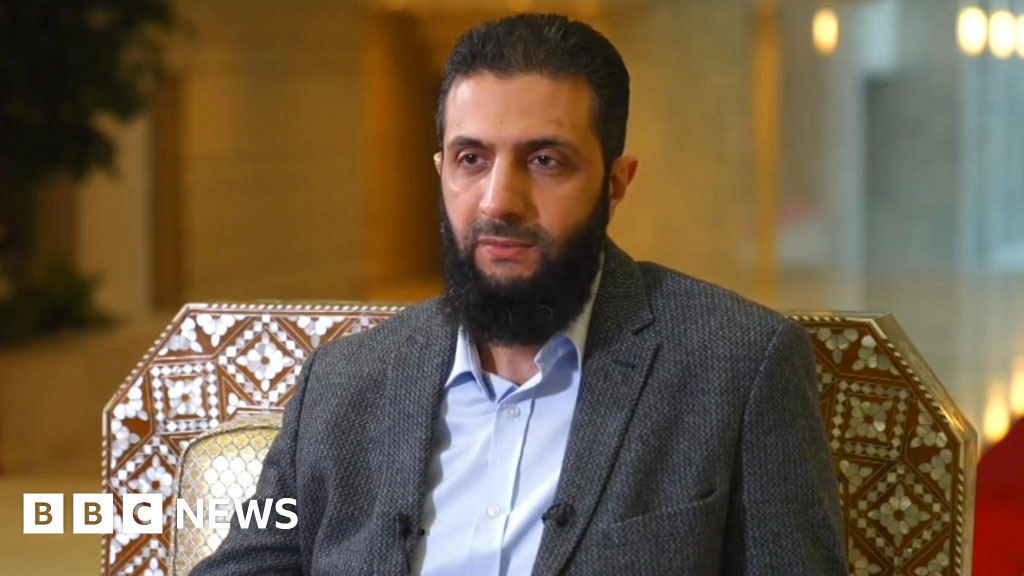
Syria not threat to world, rebel leader al-Sharaa tells BBC
The de facto leader of Syria, Ahmed al-Sharaa, has said the country is exhausted by war and is not a threat to its neighbours or to the West.
In an interview with the BBC in Damascus, he called for sanctions on Syria to be lifted.
“Now, after all that has happened, sanctions must be lifted because they were targeted at the old regime. The victim and the oppressor should not be treated in the same way,” he said.
Sharaa led the lightning offensive that toppled Bashar al-Assad’s regime less than two weeks ago. He is the leader of the Hayat Tahrir al-Sham (HTS), the dominant group in the rebel alliance, and was previously known by his nom de guerre of Abu Mohammed al-Jolani.
He said HTS should be de-listed as a terrorist organisation. It is designated as one by the UN, US, EU and UK, among many others, as it started as a splinter group of al-Qaeda, which it broke away from in 2016.
Sharaa said HTS was not a terrorist group.
They did not target civilians or civilian areas, he said. In fact, they considered themselves to be victim of the crimes of the Assad regime.
He denied that he wanted to turn Syria into a version of Afghanistan.
READ ALSO:
- Tinubu’s 2025 budget will increase poverty, worsen economy – PDP
- Real Madrid outclass Pachuca to win FIFA Intercontinental Cup
- Israel hits ports, energy sites in Yemen after missile intercepted
Sharaa said the countries were very different, with different traditions. Afghanistan was a tribal society. In Syria, he said, there was a different mindset.
He said he believed in education for women.
“We’ve had universities in Idlib for more than eight years,” Sharaa said, referring to Syria’s north-western province that has been held by rebels since 2011.
“I think the percentage of women in universities is more than 60%.”
And when asked whether the consumption of alcohol would be allowed, Sharaa said: “There are many things I just don’t have the right to talk about because they are legal issues.”
He added that there would be a “Syrian committee of legal experts to write a constitution. They will decide. And any ruler or president will have to follow the law”.
Sharaa was relaxed throughout the interview, wearing civilian clothes, and tried to offer reassurance to all those who believe his group has not broken with its extremist past.
Many Syrians do not believe him.
The actions of Syria’s new rulers in the next few months will indicate the kind of country they want Syria to be – and the way they want to rule it.
Syria not threat to world, rebel leader al-Sharaa tells BBC
BBC
International
Israel hits ports, energy sites in Yemen after missile intercepted
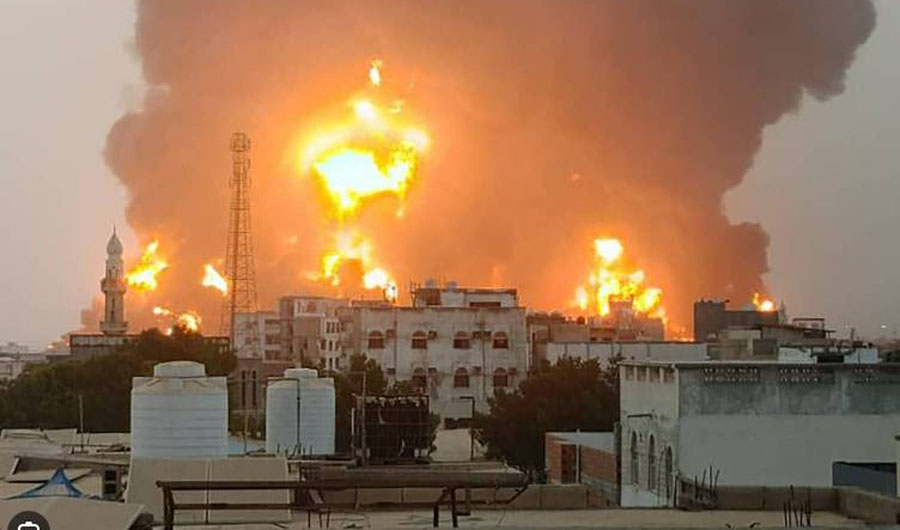
Israel hits ports, energy sites in Yemen after missile intercepted
JERUSALEM: Israel said Thursday it struck ports and energy infrastructure it alleges are used by Houthi militants, after intercepting a missile fired by the group.
Israel’s military said it “conducted precise strikes on Houthi military targets in Yemen — including ports and energy infrastructure in Sanaa, which the Houthis have been using in ways that effectively contributed to their military actions.”
The announcement came shortly after Israel said it had intercepted a missile fired from Yemen.
Al-Masira, a media channel belonging to the Houthis, said a series of “aggressive raids” were launched in the Yemeni capital of Sanaa and the port city of Hodeidah.
It reported raids that “targeted two central power plants” in Yemen’s capital Sanaa, while in Hodeidah it said “the enemy launched four aggressive raids targeting the port… and two raids targeting” an oil facility.
The strikes were the second time this week that Israel’s military has intercepted a missile from Yemen.
On Monday, the Houthis claimed a missile launch they said was aimed at “a military target of the Israeli enemy in the occupied area of Yaffa” — a reference to Israel’s Tel Aviv area.
READ ALSO:
- Gaza mediators intensify ceasefire efforts, Israeli strikes kill 20 people
- PDP expels South-East national vice chairperson over anti-party activities
- Your information on $1bn investment misleading, Dangote Refinery replies NNPCL
Also Monday, an Israeli navy missile boat intercepted a drone in the Mediterranean after it was launched from Yemen, the military said.
The Houthi militants have said they are acting in solidarity with Palestinians and pledged Monday to continue operations “until the aggression on Gaza stops and the siege is lifted.”
On December 9, a drone claimed by Houthis exploded on the top floor of a residential building in the central Israel city of Yavne, causing no casualties.
In July, a Houthi drone attack in Tel Aviv killed an Israeli civilian, prompting retaliatory strikes on the Yemeni port of Hodeidah.
The Houthis have also regularly targeted shipping in the Red Sea and the Gulf of Aden, leading to retaliatory strikes on Houthi targets by United States and sometimes British forces.
Israeli military spokesman Daniel Hagari said the group had become a “global threat,” pointing to Iran’s support for the militants.
“We will continue to act against anyone, anyone in the Middle East, that threatens the state of Israel,” he said.
Israel hits ports, energy sites in Yemen after missile intercepted
International
Gaza mediators intensify ceasefire efforts, Israeli strikes kill 20 people
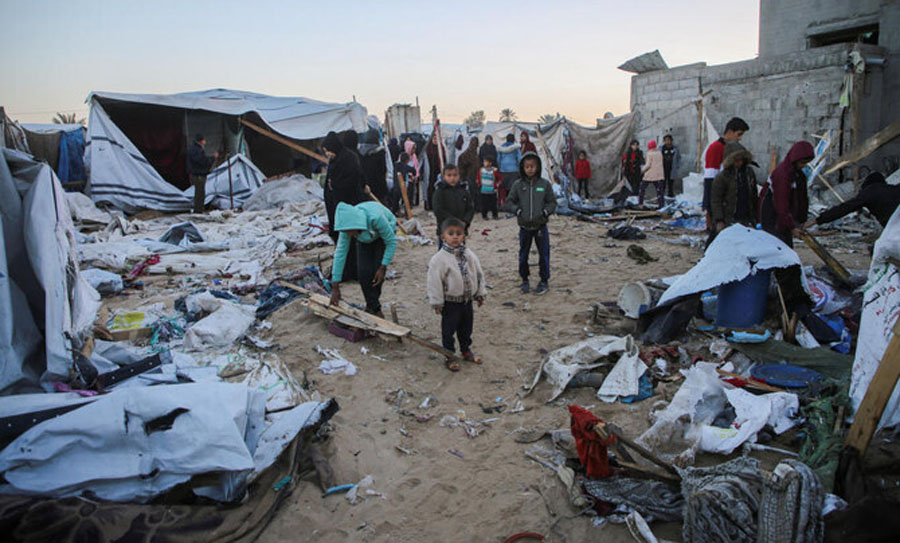
Gaza mediators intensify ceasefire efforts, Israeli strikes kill 20 people
CAIRO: The United States, joined by Arab mediators, sought on Wednesday to conclude an agreement between Israel and Hamas to halt the 14-month-old war in the Gaza Strip where medics said Israeli strikes killed at least 20 Palestinians overnight.
A Palestinian official close to the negotiations said on Wednesday that mediators had narrowed gaps on most of the agreement’s clauses. He said Israel had introduced conditions which Hamas rejected but would not elaborate.
On Tuesday, sources close to the talks in Cairo, the Egyptian capital, said an agreement could be signed in coming days on a ceasefire and a release of hostages held in Gaza in return for Palestinian prisoners held by Israel.
Medics said an Israeli airstrike killed at least 10 people in a house in the northern town of Beit Lahiya while six were killed in separate airstrikes in Gaza City, Nuseirat camp in central areas, and Rafah near the border with Egypt.
In Beit Hanoun in the northern Gaza Strip, medics said four people were killed in an airstrike on a house. There was no immediate comment from the Israeli military spokesman.
Israeli forces have operated in the towns of Beit Hanoun and Beit Lahiya as well as the nearby Jabalia camp since October, in a campaign the military said aimed to prevent Hamas militants from regrouping.
Palestinians accuse Israel of carrying out acts of “ethnic cleansing” to depopulate the northern edge of the enclave to create a buffer zone. Israel denies it.
READ ALSO:
- PDP expels South-East national vice chairperson over anti-party activities
- Your information on $1bn investment misleading, Dangote Refinery replies NNPCL
- Many die at Ibadan children’s Christmas party stampede, organisers arrested
Hamas does not disclose its casualties, and the Palestinian health ministry does not distinguish in its daily death toll between combatants and non-combatants.
On Wednesday, the Israeli military said it struck a number of Hamas militants planning an imminent attack against Israeli forces operating in Jabalia.
Later on Wednesday, Muhammad Saleh, director of Al-Awda Hospital in Jabalia, said Israeli shelling in the vicinity damaged the facility, wounding seven medics and one patient inside the hospital.
The Israeli military had no immediate comment.
In the Central Gaza camp of Bureij, Palestinian families began leaving some districts after the army posted new evacuation orders on X and in written and audio messages to mobile phones of some of the population there, citing new firing of rockets by Palestinian militants from the area.
CEASEFIRE GAINS MOMENTUM
The US administration, joined by mediators from Egypt and Qatar, has made intensive efforts in recent days to advance the talks before President Joe Biden leaves office next month.
In Jerusalem, Israeli President Isaac Herzog met Adam Boehler, US President-elect Donald Trump’s designated envoy for hostage affairs. Trump has threatened that “all hell is going to break out” if Hamas does not release its hostages by Jan. 20, the day Trump returns to the White House.
CIA Director William Burns was due in Doha on Wednesday for talks with Qatari Prime Minister Sheikh Mohammed bin Abdulrahman Al-Thani on bridging remaining gaps between Israel and Hamas, other knowledgeable sources said. The CIA declined to comment.
Israeli negotiators were in Doha on Monday looking to bridge gaps between Israel and Hamas on a deal Biden outlined in May.
There have been repeated rounds of talks over the past year, all of which have failed, with Israel insisting on retaining a military presence in Gaza and Hamas refusing to release hostages until the troops pulled out.
The war in Gaza, triggered by a Hamas-led attack on communities in southern Israel that killed some 1,200 people and saw more than 250 abducted as hostages, has sent shockwaves across the Middle East and left Israel isolated internationally.
Israel’s campaign has killed more than 45,000 Palestinians, displaced most of the 2.3 million population and reduced much of the coastal enclave to ruins.
Gaza mediators intensify ceasefire efforts, Israeli strikes kill 20 people
ARAB NEWS
-

 Railway1 day ago
Railway1 day agoLagos Rail Mass Transit part of FG free train ride – NRC
-

 metro17 hours ago
metro17 hours agoWhy we displayed ‘Jesus Christ is not God’ banner at Lekki mosque -Imam
-

 metro3 days ago
metro3 days agoCourt stops customs from seizing imported rice in open market
-

 metro3 days ago
metro3 days agoIbadan stampede: Tinubu orders probe as death toll hits 40
-

 metro2 days ago
metro2 days agoIbadan stampede: Ooni reacts after arrest of ex-wife
-

 metro3 days ago
metro3 days agoAfe Babalola: Court grants Dele Farotimi bail, barred from media interviews
-

 metro2 days ago
metro2 days agoNIMC warns against extortion, reaffirms free NIN enrollment
-

 News3 days ago
News3 days agoAdebayo Ogunlesi, 2 other Nigerians make Forbes 50 wealthiest Black Americans list 2024

